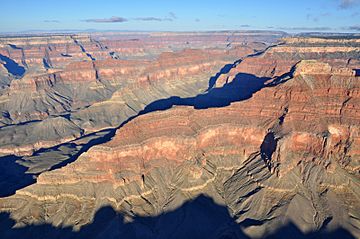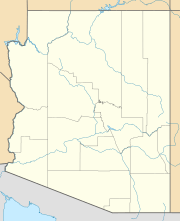Mencius Temple facts for kids
Quick facts for kids Mencius Temple |
|
|---|---|
 |
|
| Highest point | |
| Elevation | 7,001 ft (2,134 m) |
| Prominence | 461 ft (141 m) |
| Parent peak | Confucius Temple |
| Naming | |
| Etymology | Mencius |
| Geography | |
| Location | Grand Canyon Coconino County, Arizona. U.S. |
| Topo map | USGS Shiva Temple |
| Geology | |
| Mountain type | sedimentary |
| Type of rock | Kaibab Limestone-(prominence), Toroweap Formation, Hermit Formation, Supai Group, Redwall Limestone, (Tonto Group- 3-units) _3-Muav Limestone, _2-Bright Angel Shale, _1-Tapeats Sandstone, Vishnu Basement Rocks, (Metamorphic Rocks) |
Mencius Temple is a huge rock formation, also known as a butte, located in the famous Grand Canyon in Arizona, USA. It stands tall at 7,001 feet (about 2,134 meters) above sea level. This impressive butte is part of a pair of twin peaks, with its partner being Confucius Temple. Mencius Temple is found in the western part of the Grand Canyon. It sits just south of Confucius Temple, about half a mile away. A long ridge, made of reddish rock layers, stretches south from Mencius Temple towards the Colorado River.
Contents
Mencius Temple: A Giant Rock in the Grand Canyon
Mencius Temple is a very tall, flat-topped hill or mountain, which is what a butte is. It reaches an elevation of 7,001 feet. This makes it one of the many amazing natural landmarks in the Grand Canyon National Park. The Grand Canyon is a massive canyon carved by the Colorado River over millions of years.
Why Is It Called Mencius Temple?
The name "Mencius Temple" comes from Mencius, a famous ancient Chinese philosopher. He lived around 372–289 BC. He was a very important thinker, just like Confucius. Many features in the Grand Canyon are named after mythological figures or philosophers. This butte was once called "Twin Buttes South" because it's the southern one of the two main peaks.
What Is Mencius Temple Made Of?
Mencius Temple is mostly made of sedimentary rock. This type of rock forms when layers of sand, mud, and other materials settle over time and get pressed together. You can see different colored layers in the butte, like a giant cake. These layers tell a story about Earth's history.
Some of the main rock layers you can see in Mencius Temple include:
- Kaibab Limestone: This is the top layer, often forming the cap of many Grand Canyon buttes.
- Toroweap Formation: Found just below the Kaibab Limestone.
- Hermit Formation: A reddish layer often seen below the Toroweap.
- Supai Group: This group of layers is known for its reddish color.
- Redwall Limestone: A very thick and often cliff-forming layer.
- Tonto Group: This group includes three main layers:
* Muav Limestone * Bright Angel Shale * Tapeats Sandstone Below these sedimentary layers, you might find even older rocks called Vishnu Basement Rocks. These are metamorphic rocks, meaning they changed due to heat and pressure deep inside the Earth.
Where Is Mencius Temple Located?
Mencius Temple is located in Coconino County, Arizona. It's a significant landmark within the western part of the Grand Canyon. It's situated about 2 miles below a spot called Point Sublime. The butte also borders the western side of the Crystal Creek (Arizona) drainage. To its west, you'll find Tuna Canyon, which also drains southwards from Point Sublime. Its location near the Colorado River makes it a key feature in the vast landscape of the Grand Canyon.
Reflist
 | Janet Taylor Pickett |
 | Synthia Saint James |
 | Howardena Pindell |
 | Faith Ringgold |


